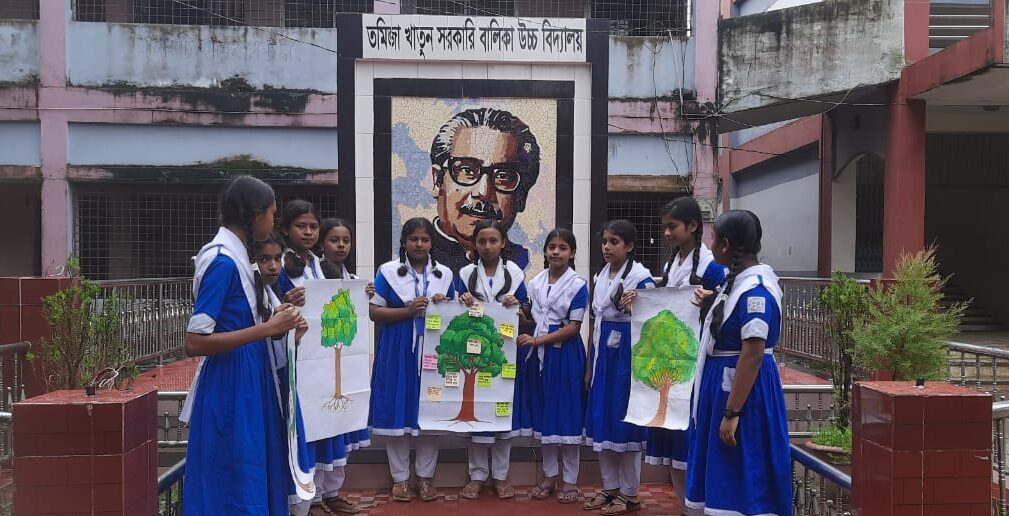
More than 2,000 students across 19 schools in Bangladesh have actively engaged in Ethics Clubs, igniting a ripple effect of positive change. These clubs, which were established during the implementation phase of the Ethics Education Fellowship program, serve as catalysts for fostering interfaith and intercultural learning and dialogue among students.
Through active teacher-student collaboration and various co-curricular activities, students gained practical experience while building their capacities in self-reflection, respect for diversity, dialogue, global citizenship and many other topics.
Different events and campaigns were carried out during the implementation of ethics education in the schools, catering to the needs of the communities. The “Plastic Free Campus” campaign was an impactful intervention in which learners created awareness in the local areas to reduce the use of plastic and support the protection of nature. Similarly, the “Honesty Store” project established a self-regulated school store with stationery, sanitary napkins and snacks, with no salesperson. The objective was to foster an environment of trust and responsibility, where students could manage their resources in an ethical manner driven by honest decision-making.
Field visits to various places of worship and sites of religious significance played a crucial role in fostering interfaith learning and dialogue among both teachers and students. Many learners identified these experiences as the highlight of their participation in the ethics education program, demonstrating a heightened interest in cultivating relationships and bonds within their community, particularly among individuals representing diverse faiths and cultures.
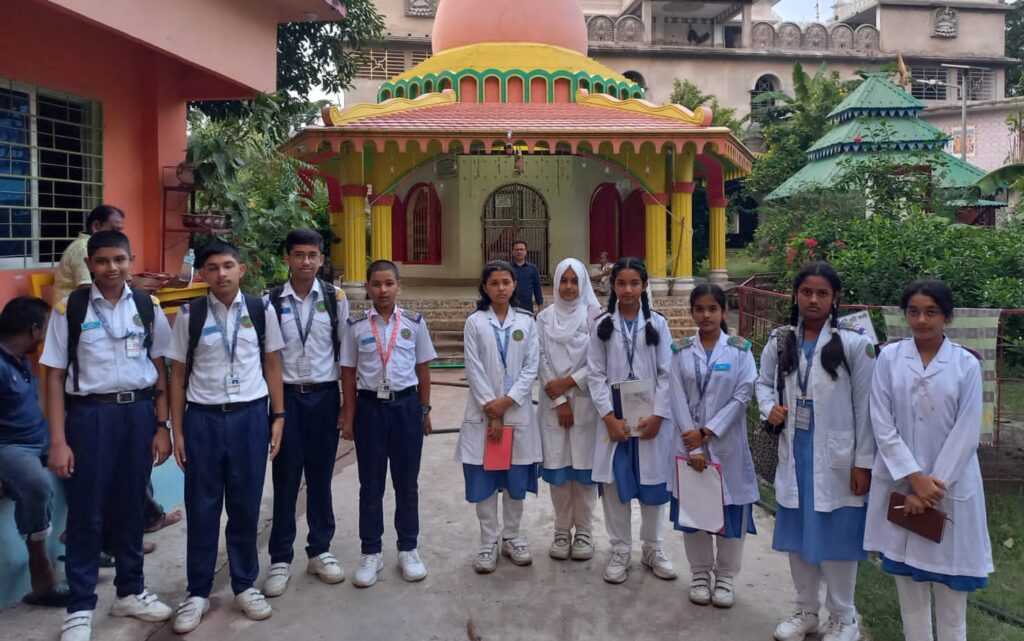
“Earlier, I had a negative attitude towards people from other religions. But after visiting different religious places and engaging in dialogue, I’ve come to respect other religious values and rituals”, expressed one of the students.
Visible Impact on the Community
In Bangladesh, the implementation of ethics education with schoolchildren has brought forth a multitude of positive impacts throughout its learning communities. The Monitoring, Evaluation and Learning report highlights the creation of a positive mindset among educators, stronger relationships between learners and teachers and an improved ability to create safer learning environments as the main achievements of this intervention.
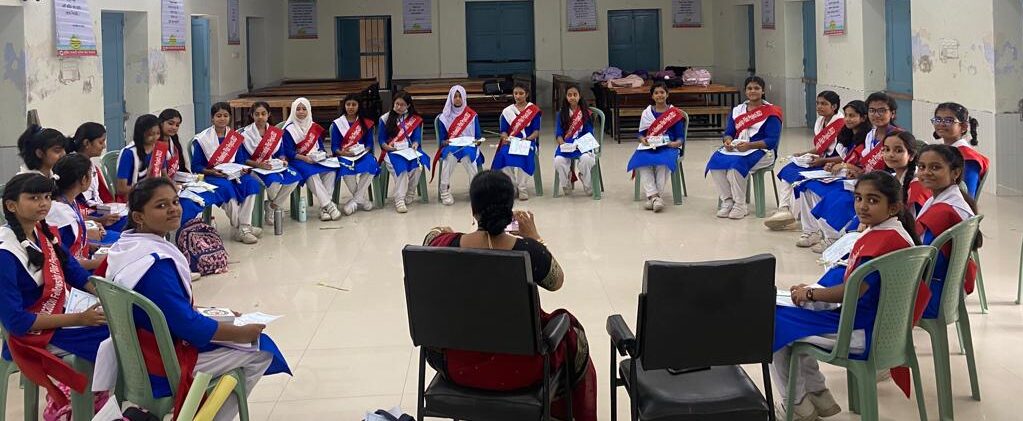
From the perspective of the learners, those who were involved with the Ethics Clubs showcased very positive behavioral changes in different aspects such as an increased sense of responsibility, self-driven nature, exchanging views with teachers without fear, better communication skills, interest in volunteering service and helping others, fostering respect and healthy relationships, problem-solving and critical thinking. In specific instances, there were cases where certain student groups underwent a transformative shift in their perspectives regarding individuals with disabilities. They transitioned from focusing on physical differences and intellectual abilities to cultivating empathy and respect. In other cases, students started to value diversity and learned how to coexist and accept communities of different faiths and cultures.
Similarly, the teachers who were engaged in the implementation also shared certain transformative experiences such as their enhanced world views, building better relationships among peers, students and parents, and an increased sense of responsibility towards the future of their communities.
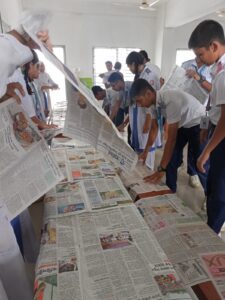
Furthermore that, the community outside the school also experienced a similar kind of social transformation as the learners engaged with their parents and extended community members, allowing a deeper discussion and reflection within the community at large. This facilitated a transformation of values among community members where their perspectives on diversity, intercultural and interreligious integration, inclusivity of decision-making and sense of social responsibility have shifted.
“The ethics education program changed my teaching philosophy. Are we performing rightly to achieve the parents’ dream?”, posed one of the teachers.
Potential for the Transformation of Education
From the national program design to implementation, different stakeholders were involved in the process including teachers, school management committees, parents, students, and policymakers. This allowed the academic and practical objectives of the program to meet each of their counterparts and link the Global Goals for Sustainable Development, specifically focusing on Target 4.7 to be mainstreamed through a multistakeholder-led process and grounded local knowledge and structures.
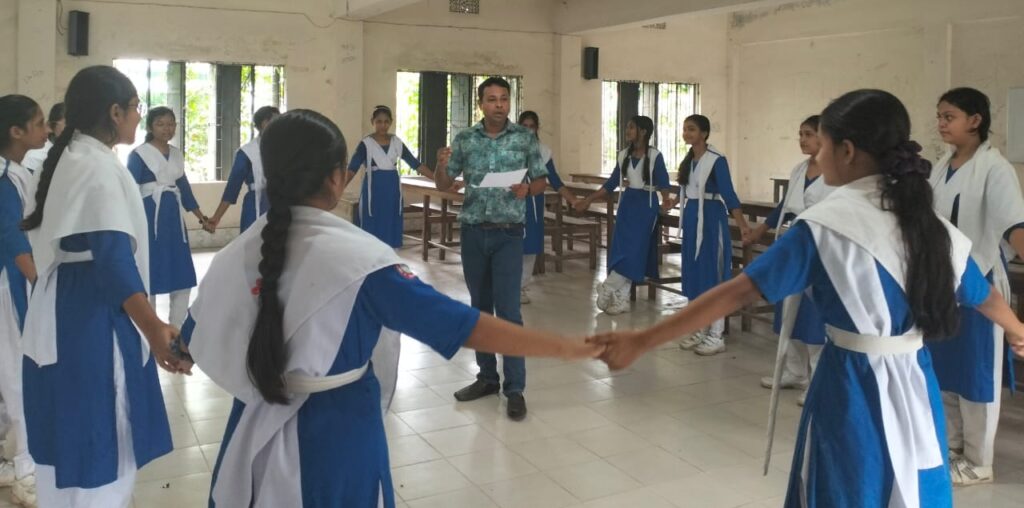
The Ministry of Education has directed the preparation of a teacher training manual tailored to the context of Bangladesh. This manual will undergo validation by all relevant stakeholders to ensure its alignment with local needs and perspectives. Subsequently, it will be integrated into the process of reviewing the national curriculum. Furthermore, discussions have commenced regarding the expansion of the program to encompass an additional 45 national schools, madrasa schools, and technical schools in its second phase.
Continuous support for teacher training and school-wide implementation of Ethics Clubs have been identified as high-impact interventions for this transformative process. At a systemic level, the program has contributed to a positive cultural change within the implementing schools towards a greater emphasis on ethical values, social responsibility, and moral leadership. Further, they have become more engaged with their local communities and global society, emphasizing ethical engagement and service-learning opportunities for students and faculty alike. Upon this, the policymakers have realized and emphasized the value of ethics education and the need for its integration into the national curriculum of teacher education, across various disciplines, and at different levels of education.
We would like to extend our warm gratitude towards all the implementing partners from Bangladesh, including the government, non-government, academic, religious and other forms of institutions who supported this initiative to reach this level of success. Moreover, the fellows from Bangladesh, including Mr. S. M. Shafiul Alam, Lieutenant Colonel Zonayed Ahmed, Mr. Joydip Dey, Ms. Geetanjali Barua, and Dr. Syed Mizanur Rahaman.